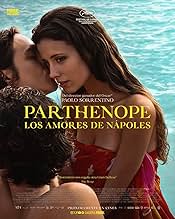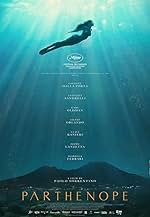Partenope ist eine Frau, die den Namen ihrer Stadt trägt. Ist sie eine Sirene oder ein Mythos?Partenope ist eine Frau, die den Namen ihrer Stadt trägt. Ist sie eine Sirene oder ein Mythos?Partenope ist eine Frau, die den Namen ihrer Stadt trägt. Ist sie eine Sirene oder ein Mythos?
- Regie
- Drehbuch
- Hauptbesetzung
- Auszeichnungen
- 7 Gewinne & 25 Nominierungen insgesamt
Antonio Annina
- Raimondo 10 anni
- (as Antonino Annina)
Maria Rosaria Bozzon
- Vecchia megera
- (as Mariarosaria Bozzon)
Zusammenfassung
Reviewers say 'Parthenope' by Paolo Sorrentino is visually stunning with breathtaking cinematography and beautiful Naples scenery. It explores themes of beauty, youth, love, and self-discovery. Celeste Dalla Porta's performance is praised for its allure and enigmatic quality. However, the film has mixed reviews, with some finding it pretentious and lacking substance, focusing too much on aesthetics. The narrative structure and character development are contentious, with some appreciating the philosophical approach and others finding it incoherent and shallow.
Empfohlene Bewertungen
"As complete as she is-with all her goods and her ills-do you know who she reminds me of?... Naples"
"The most beautiful gift is not the most expensive; it is the most fragile." Marques Rebelo, O Trapicheiro.
As the lights of the nineteenth century faded, Eça de Queirós-the great Eça-painted, through the face of Gonçalo Mendes Ramires, a symbolic portrait of Portugal that, as any good symbol does, contained everything, even when it sometimes seemed to contain nothing at all. Last year, Paolo Sorrentino, the great artist of contemporary cinema, painted with the face and body of Parthenope the symbolic portrait of Naples: yet another of his masterpieces, unveiling a city and a woman that, in the blink of an eye, are one in the lyrical conception of poet Sorrentino. Naples, or Parthenope- a name that evokes the mythological siren whose body is said to have given birth to the city-is not merely a backdrop, but a pulsating character. And Parthenope, the protagonist (portrayed with an ethereal melancholy), is its incarnation: born in the waters of the Mediterranean, like Venus, like Naples, she carries within her the contradiction of the sublime and the grotesque, of desire and death.
Sorrentino, heir to a Fellini-esque sensitivity for both beauty and the bizarre, does not fear excess. In scenes such as the party in Capri-where beautiful faces and bodies dissolved under golden lights-Parthenope, in her melancholy, asks her millionaire admirer: "Lei non pensa che il desiderio sia un mistero e il sesso il suo funerale?" [don't you think that desire is a mystery and sex its funeral]. The phrase echoes like an epitaph, laid bare to reveal the fragility and preciousness of desire and youth: desire as an unfathomable mystery, and sex as the funeral ritual of something that will never be consummated. It is in this interplay of opposites that the narrative unfolds, between the sculptural beauty of Naples' landscapes and the harshness of its forgotten alleys, where the protagonist walks with Roberto, an ambiguous character who unveils to her the other side of the city-a Naples both raw and poetic, where the contrast between the opulent luxury of grand houses and the simplicity of neglected corners becomes a metaphor for the city's inherent duality. Every step, every exchanged glance, carries the tension between the ephemeral and the eternal, between the urgent and the trivial. There, in the interplay of shadow and light, "the irrelevant merges with the decisive," as if chance itself became the silent arbiter of destinies. But is there any sense in speaking of chance? In song, Riccardo Cocciante tells us otherwise-everything was already foreseen.
"Beauty is like war: it opens doors," declares the alcoholic writer John Cheever (portrayed by Gary Oldman) in his brief, ghostly appearance. Drunkenly, he murmurs about the "scent of dead loves," a fragrance he claims to detect in his hotel room, surrounded by bottles of alcohol. So many dead loves in the city, in Parthenope's life. Here, her beauty is a weapon-a weapon that invariably wounds those who wield it: capable of granting access to privileged worlds, yet also imprisoning one in gilded cages. But Parthenope is a woman-city that "sfugge sempre": she flees, escapes, refuses to be deciphered, and always has a retort ready to disarm her interlocutors. What mysteries lie hidden within her?
The narrative delves into a universe where every image is meticulously sculpted to reveal the mysteries of existence. Amid this tapestry of contrasts stands Cardinal Tesorone, with his imposing and perverse figure, his grotesque nature and skepticism-a link in a Neapolitan religiosity divided between the sacred and the profane. His discourse, laden with solemnity and irony, resonates in the scene where, clad only in the adornments of San Gennaro's treasure, he attempts to seduce the city of Parthenope-or perhaps merely the delectable Parthenope herself-with the lubricity of a faun and the cynicism of an old man. Il tempo che scorre insieme al dolore.
In every dialogue, in every exchanged glance, the question echoes: is it possible that by trying to master desire, love ultimately imprisons its own freedom? And in this eternal ebb and flow between wanting and being, the protagonist remains undefinable, always escaping, constantly reinventing herself-as if the very city of Naples refused to be confined by labels or predetermined destinies.
In the twilight of her existence-be it amidst the effervescence of a Capri celebration or in the solitude of a dim alley-Parthenope presents herself as the synthesis of all the opposites that coexist in Naples: the sublime and the grotesque, desire and death, fragility and strength. It is this paradoxical combination that renders her portrait so unforgettable-a mirror, perhaps, of a city whose soul, despite everything, continues to pulse with an indomitable vitality, defying time and destiny with an irony that, in the end, remains its sole certainty.
- Eça de Queirós, The Illustrious House of Ramires, mutatis mutandis.
"The most beautiful gift is not the most expensive; it is the most fragile." Marques Rebelo, O Trapicheiro.
As the lights of the nineteenth century faded, Eça de Queirós-the great Eça-painted, through the face of Gonçalo Mendes Ramires, a symbolic portrait of Portugal that, as any good symbol does, contained everything, even when it sometimes seemed to contain nothing at all. Last year, Paolo Sorrentino, the great artist of contemporary cinema, painted with the face and body of Parthenope the symbolic portrait of Naples: yet another of his masterpieces, unveiling a city and a woman that, in the blink of an eye, are one in the lyrical conception of poet Sorrentino. Naples, or Parthenope- a name that evokes the mythological siren whose body is said to have given birth to the city-is not merely a backdrop, but a pulsating character. And Parthenope, the protagonist (portrayed with an ethereal melancholy), is its incarnation: born in the waters of the Mediterranean, like Venus, like Naples, she carries within her the contradiction of the sublime and the grotesque, of desire and death.
Sorrentino, heir to a Fellini-esque sensitivity for both beauty and the bizarre, does not fear excess. In scenes such as the party in Capri-where beautiful faces and bodies dissolved under golden lights-Parthenope, in her melancholy, asks her millionaire admirer: "Lei non pensa che il desiderio sia un mistero e il sesso il suo funerale?" [don't you think that desire is a mystery and sex its funeral]. The phrase echoes like an epitaph, laid bare to reveal the fragility and preciousness of desire and youth: desire as an unfathomable mystery, and sex as the funeral ritual of something that will never be consummated. It is in this interplay of opposites that the narrative unfolds, between the sculptural beauty of Naples' landscapes and the harshness of its forgotten alleys, where the protagonist walks with Roberto, an ambiguous character who unveils to her the other side of the city-a Naples both raw and poetic, where the contrast between the opulent luxury of grand houses and the simplicity of neglected corners becomes a metaphor for the city's inherent duality. Every step, every exchanged glance, carries the tension between the ephemeral and the eternal, between the urgent and the trivial. There, in the interplay of shadow and light, "the irrelevant merges with the decisive," as if chance itself became the silent arbiter of destinies. But is there any sense in speaking of chance? In song, Riccardo Cocciante tells us otherwise-everything was already foreseen.
"Beauty is like war: it opens doors," declares the alcoholic writer John Cheever (portrayed by Gary Oldman) in his brief, ghostly appearance. Drunkenly, he murmurs about the "scent of dead loves," a fragrance he claims to detect in his hotel room, surrounded by bottles of alcohol. So many dead loves in the city, in Parthenope's life. Here, her beauty is a weapon-a weapon that invariably wounds those who wield it: capable of granting access to privileged worlds, yet also imprisoning one in gilded cages. But Parthenope is a woman-city that "sfugge sempre": she flees, escapes, refuses to be deciphered, and always has a retort ready to disarm her interlocutors. What mysteries lie hidden within her?
The narrative delves into a universe where every image is meticulously sculpted to reveal the mysteries of existence. Amid this tapestry of contrasts stands Cardinal Tesorone, with his imposing and perverse figure, his grotesque nature and skepticism-a link in a Neapolitan religiosity divided between the sacred and the profane. His discourse, laden with solemnity and irony, resonates in the scene where, clad only in the adornments of San Gennaro's treasure, he attempts to seduce the city of Parthenope-or perhaps merely the delectable Parthenope herself-with the lubricity of a faun and the cynicism of an old man. Il tempo che scorre insieme al dolore.
In every dialogue, in every exchanged glance, the question echoes: is it possible that by trying to master desire, love ultimately imprisons its own freedom? And in this eternal ebb and flow between wanting and being, the protagonist remains undefinable, always escaping, constantly reinventing herself-as if the very city of Naples refused to be confined by labels or predetermined destinies.
In the twilight of her existence-be it amidst the effervescence of a Capri celebration or in the solitude of a dim alley-Parthenope presents herself as the synthesis of all the opposites that coexist in Naples: the sublime and the grotesque, desire and death, fragility and strength. It is this paradoxical combination that renders her portrait so unforgettable-a mirror, perhaps, of a city whose soul, despite everything, continues to pulse with an indomitable vitality, defying time and destiny with an irony that, in the end, remains its sole certainty.
Paerthenope isn´t just a film, it is a painting alive: every scene is filmed with such sensibility... If you wonder what real Beauty is, then the film will give you the answer. A real masterpiece in my opinion, that will make you fall in love with the main actress (you can´t escape that !) but also with the beautiful city of Napoli, a city filled with culture and history, the heart of the Italian authenticity. A film that takes you for a walk through essential philosophical questions such as the true essence of Beauty and the ephemeral youth. To put it into a nutshell, I would say Parthenope is a BEAUTIFUL DEPRESSING movie.
May be Parthenope is not the best, but I still think it might be my personal favorite among all of Sorrentino's films.
For me, it is not about history, religion, philosophy, or even family, but simply the story of a young goddess experiencing the beauty, love, desire and sorrow of life-a film that ultimately turns the gaze back to our everyone's own lives. So fragile, so nonsensical, so bizarre, so contradictory, so meaningless-yet still met with both smiles and tears in the face of reality... o forse non è così.
I don't see Parthenope as a "moralized lecture" that offers answers or explanations. On the contrary, it feels like a breathtaking and poetic piece of prose that touches me deeply.
For me, it is not about history, religion, philosophy, or even family, but simply the story of a young goddess experiencing the beauty, love, desire and sorrow of life-a film that ultimately turns the gaze back to our everyone's own lives. So fragile, so nonsensical, so bizarre, so contradictory, so meaningless-yet still met with both smiles and tears in the face of reality... o forse non è così.
I don't see Parthenope as a "moralized lecture" that offers answers or explanations. On the contrary, it feels like a breathtaking and poetic piece of prose that touches me deeply.
I believe this film has a lot more in common with last year's other hit, The Substance, than you might think. Because in my opinion, Parthenope shouldn't be seen as a human character: she represents Youth itself. Anyone who is attracted to Parthenope is actually attracted to Youth.
"She's always fleeing," says her brother Raimondo, because Youth is a substance that constantly slips through our fingers like sand.
I think there is also an obvious parallel with Aphrodite, who was born from sea foam: Parthenope was born in the water of the Mediterranean Sea.
But nice metaphors, analogies and beautiful cinematography are not enough to touch my soul. For me, this film is only a faint shadow of La grande bellezza. I couldn't help but compare the two films and think that Sorrentino put much more soul into La grande bellezza, because he understands men, but not so much women.
What also disappointed me in this film was the acting of Celeste Dalla Porta and Dario Aita: it's not my cup of tea at all, I found their performance very forced. Although I enjoyed the acting of Luisa Ranieri and Gary Oldman.
Overall, it definitely won't be my favorite Sorrentino film.
"She's always fleeing," says her brother Raimondo, because Youth is a substance that constantly slips through our fingers like sand.
I think there is also an obvious parallel with Aphrodite, who was born from sea foam: Parthenope was born in the water of the Mediterranean Sea.
But nice metaphors, analogies and beautiful cinematography are not enough to touch my soul. For me, this film is only a faint shadow of La grande bellezza. I couldn't help but compare the two films and think that Sorrentino put much more soul into La grande bellezza, because he understands men, but not so much women.
What also disappointed me in this film was the acting of Celeste Dalla Porta and Dario Aita: it's not my cup of tea at all, I found their performance very forced. Although I enjoyed the acting of Luisa Ranieri and Gary Oldman.
Overall, it definitely won't be my favorite Sorrentino film.
Why would you watch this movie? Probably based on what we know that is said about Sorrentino and his perfect eye for the breathtaking visuals. Indeed, with the first shot in the movie he makes it clear - showing a carriage and the "Captain" floating on the sea with the view on the stunning coast of Napoli!
Not its beauty, but the Napoli itself is one of the key topics. If this city could be personified, it will definitely be a beautiful woman. Only, just like a person, Napoli is much more than a beauty and it definitely has its dark places.
It personally touched me that one of the key topics (and a key question) is also (what is) a study of Anthropology. Anthropology, formed of two Latin words, meaning a person and science. No other study could have been better for this movie, rather than a study of the most complicated being in this world. I will save you from spoilers and let you think of what Anthropology is before the movie answers it for you, but keep in mind that it is shown by the biggest "superpowers" of Parthenope and especially in her brother Raimondo, who in my opinion was the one that taught that to Parthenope.
The third matter that made me absolutely passionate about this movie was the precise choice of words and creation of dialogues. Her love interests were mostly people who had the most beautiful way of expressing their emotions. Listing to their dialogues made me feel like I've read a book.
I highly recommend watching this movie, although it may have some bizarre moments that can make you feel uneasy. But if you are open to understanding and accepting the strangeness, it will definitely let you "get carried away."
Not its beauty, but the Napoli itself is one of the key topics. If this city could be personified, it will definitely be a beautiful woman. Only, just like a person, Napoli is much more than a beauty and it definitely has its dark places.
It personally touched me that one of the key topics (and a key question) is also (what is) a study of Anthropology. Anthropology, formed of two Latin words, meaning a person and science. No other study could have been better for this movie, rather than a study of the most complicated being in this world. I will save you from spoilers and let you think of what Anthropology is before the movie answers it for you, but keep in mind that it is shown by the biggest "superpowers" of Parthenope and especially in her brother Raimondo, who in my opinion was the one that taught that to Parthenope.
The third matter that made me absolutely passionate about this movie was the precise choice of words and creation of dialogues. Her love interests were mostly people who had the most beautiful way of expressing their emotions. Listing to their dialogues made me feel like I've read a book.
I highly recommend watching this movie, although it may have some bizarre moments that can make you feel uneasy. But if you are open to understanding and accepting the strangeness, it will definitely let you "get carried away."
Wusstest du schon
- WissenswertesPaolo Sorrentino said he reached out to Gary Oldman about filming a cameo after hearing that Oldman was a huge fan of his. Oldman immediately accepted saying Sorrentino was at the top of his wish list to collaborate with.
- Zitate
Devoto Marotta: It's very difficult to see, because it's the last thing you learn.
Parthenope: When do you learn to see?
Devoto Marotta: When everything else begins to be missing.
Parthenope: What is everything else?
Devoto Marotta: Love, youth, desire, emotion, pleasure.
- SoundtracksWarmth
Written by Peter Gregson
Performed by Peter Gregson, Warren Zielinski, Magdalena Filipczak, Laurie Anderson, Ashok Klouda
Top-Auswahl
Melde dich zum Bewerten an und greife auf die Watchlist für personalisierte Empfehlungen zu.
- How long is Parthenope?Powered by Alexa
Details
- Erscheinungsdatum
- Herkunftsländer
- Offizielle Standorte
- Sprachen
- Auch bekannt als
- Партенопа
- Drehorte
- Produktionsfirmen
- Weitere beteiligte Unternehmen bei IMDbPro anzeigen
Box Office
- Budget
- 26.300.000 € (geschätzt)
- Bruttoertrag in den USA und Kanada
- 289.303 $
- Eröffnungswochenende in den USA und in Kanada
- 31.588 $
- 9. Feb. 2025
- Weltweiter Bruttoertrag
- 11.623.475 $
- Laufzeit
- 2 Std. 17 Min.(137 min)
- Farbe
- Sound-Mix
- Seitenverhältnis
- 2.39 : 1
Zu dieser Seite beitragen
Bearbeitung vorschlagen oder fehlenden Inhalt hinzufügen
































